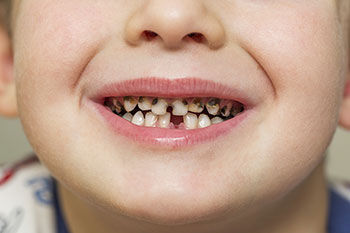
In this day and age, children are at an increased risk of developing cavities from an early age. This is due to the abundance of and easy access to sweetened foods, coupled with misinformation and poor oral hygiene habits. Cavities can form on baby teeth upon the earliest eruption through the gums, which occurs around 5-10 months old. Early childhood caries occur at lightning speed and can cause severe distress for a child. The Canadian Dental Association considers early childhood cavities a significant public health problem. Early childhood caries can lead to pain, infection, loss of confidence, trouble biting and chewing and future issues with crowding of the adult teeth.
What are Early Childhood Caries?
Early childhood caries is the presence of one or more cavities, filled teeth or missing teeth from cavities in a child’s mouth. Early childhood caries is considered an infectious disease, as it begins with bacteria entering the mouth, contributing to acid formation and damaging the teeth in the form of cavities. If left unchecked, early childhood caries can cause massive damage and long-lasting effects while being costly to treat. Baby teeth lost prematurely to early childhood caries have an adverse impact on a child’s wellbeing. It is vital to schedule your child’s first dental visit when their teeth begin to erupt.
How To Prevent Early Childhood Caries
- Do not put your child to bed with milk or sweetened juices. Just stick to water
- Begin brushing your child’s teeth at the first onset of the eruption
- Brush your child’s teeth after consumption of milk and always before bed
- Do not dip a pacifier in anything sweet before giving it to your child
- Begin using a toothpaste containing fluoride around the age of 3 by just using an amount the size of a grain of rice
- Reduce your child’s sweet intake, choose hard chewable vitamins instead of gummy vitamins
- Reduce any starchy, sticky or chewy sweetened snacks
- Teach your child to drink from a sippy cup as soon as possible. Drinking from a bottle allows liquid to pool around the front teeth
Be on the lookout for chipped, stained or discoloured teeth, as this may be the first sign of early childhood caries. If you believe your child may have early childhood caries or have any questions about it, we encourage you to contact us today to schedule a visit.
